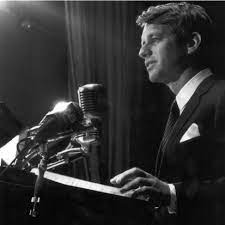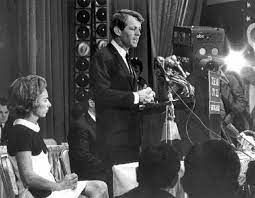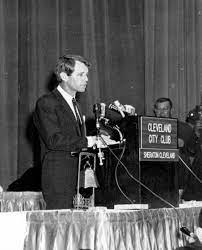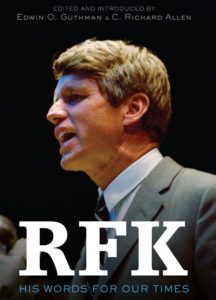
Cleveland, Ohio
April 5, 1968
[From: RFK: His Words for Our Time]After King’s death, Kennedy canceled all campaign appearances and withdrew to his Indianapolis hotel; however, various black leaders convinced him to keep a scheduled address to Cleveland’s City Club the next day and to transform it into a plea for nonviolence. Both the killing of the Nobel Peace Prize winner and the rage and riots that followed his death were on Kennedy’s mind as he asked speech writers, Adam Walinsky and Jeff Greenfield (with the candidate on the road), to work by phone with his brother’s principal draftsman, Ted Sorensen (in New York).
Kennedy himself was juxtaposing King’s assassination with others from the turbulent decade, especially the death in Dallas. Normally after a day of campaigning, he would retire to his hotel room. The night of April 4, he sat up with his aides, although he was frequently withdrawn. He eventually left, then returned to the room where Walinsky and Greenfield were working. Sitting down on a bed, he was silent for a time, then said, “You know, that fellow Harvey Lee Oswald,4 whatever his name is, set something loose in this country.” Greenfield and Walinsky, struggling to finish the draft, passed out over their typewriters in the predawn hours. Kennedy, uncharacteristically unable to sleep and (in Walinsky’s words) “prowling around,” happened upon his young aides, shut off the light, and sent them off for a few hours’ rest. As he left Greenfield, the latter said to his boss, “You aren’t so ruthless after all.” With a smile, Kennedy replied, “Don’t tell anybody.”
The candidate reviewed the speech draft as he left for Cleveland, and editing changes were still under way as the plane landed. Despite its overnight, collaborative production, its anguished eloquence would be remembered two months later, when Kennedy himself lay dying.
To a hushed luncheon crowd, mostly white executives, Kennedy spoke softly but with obvious deep emotion.

This is a time of shame and sorrow. It is not a day for politics.
I have saved this one opportunity, my only event of today, to speak briefly to you about the mindless menace of violence in America which again stains our land and every one of our lives.
It is not the concern of any one race. The victims of the violence are black and white, rich and poor, young and old, famous and unknown. They are, most important of all, human beings whom other human beings loved and needed. No one— no matter where he lives or what he does— can be certain who will suffer from some senseless act of bloodshed. And yet it goes on and on and on in this country of ours.
Why? What has violence ever accomplished? What has it ever created? No martyr’s cause has ever been stilled by his assassin’s bullet. No wrongs have ever been righted by riots and civil disorders. A sniper is only a coward, not a hero; and an uncontrolled, uncontrollable mob is only the voice of madness, not the voice of reason. Whenever any American’s life is taken by another American unnecessarily— whether it is done in the name of the law or in the defiance of the law, by one man or a gang, in cold blood or in passion, in an attack of violence or in response to violence— whenever we tear at the fabric of the life which another man has painfully and clumsily woven for himself and his children, the whole nation is degraded.
“Among free men,” said Abraham Lincoln, “there can be no successful appeal from the ballot to the bullet; and those who take such appeal are sure to lose their cause and pay the costs.”
Yet we seemingly tolerate a rising level of violence that ignores our common humanity and our claims to civilization alike. We calmly accept newspaper reports of civilian slaughter in far- off lands.
We glorify killing on movie and television screens and call it entertainment. We make it easy for men of all shades of sanity to acquire whatever weapons and ammunition they desire.
Too often we honor swagger and bluster and the wielders of force; too often we excuse those who are willing to build their own lives on the shattered dreams of others. Some Americans who preach nonviolence abroad fail to practice it here at home. Some who accuse others of inciting riots have by their own conduct invited them.
Some look for scapegoats, others look for conspiracies, but this much is clear: Violence breeds violence, repression brings retaliation, and only a cleansing of our whole society can remove this sickness from our soul.
For there is another kind of violence, slower but just as deadly destructive as the shot or the bomb in the night. This is the violence of institutions: indifference and inaction and slow decay. This is the violence that afflicts the poor, that poisons relations between men because their skin has different colors. This is the slow destruction of a child by hunger, and schools without books and homes without heat in the winter.
This is the breaking of a man’s spirit by denying him the chance to stand as a father and as a man among other men. And this too afflicts us all.
I have not come here to propose a set of specific remedies, nor is there a single set. For a broad and adequate outline we know what must be done. When you teach a man to hate and fear his brother, when you teach that he is a lesser man because of his color or his beliefs or the policies he pursues, when you teach that those who differ from you threaten your freedom or your job or your family, then you also learn to confront others not as fellow citizens but as enemies, to be met not with cooperation but with conquest; to be subjugated and mastered.
We learn, at the last, to look at our brothers as aliens, men with whom we share a city but not a community; men bound to us in common dwelling but not in common effort. We learn to share only a common fear, only a common desire to retreat from each other, only a common impulse to meet disagreement with force. For all this, there are no final answers.
Yet we know what we must do. It is to achieve true justice among our fellow citizens. The question is not what programs we should seek to enact. The question is whether we can find in our own midst and in our own hearts that leadership of humane purpose that will recognize the terrible truths of our existence.
We must admit the vanity of our false distinctions among men and learn to find our own advancement in the search for the advancement of others. We must admit in ourselves that our own children’s future cannot be built on the misfortunes of others. We must recognize that this short life can neither be ennobled or enriched by hatred or revenge.
Our lives on this planet are too short and the work to be done too great to let this spirit flourish any longer in our land. Of course we cannot vanquish it with a program, nor with a resolution. But we can perhaps remember, if only for a time, that those who live with us are our brothers, that they share with us the same short moment of life; that they seek, as do we, nothing but the chance to live out their lives in purpose and in happiness, winning what satisfaction and fulfillment they can.
Surely this bond of common faith, this bond of common goal, can begin to teach us something. Surely we can learn, at least, to look at those around us as fellow men, and surely we can begin to work a little harder to bind up the wounds among us and to become in our own hearts brothers and countrymen once again.

Kennedy left Cleveland for Washington, where fires raged throughout the nation’s capital. Soldiers in full battle gear, deployed on tanks and armored personnel carriers, attempted to keep the curfew.
On Sunday, April 7, he walked the riot- torn neighborhoods with D.C. City Councilman the Reverend Walter Fauntroy, who remembered that “the stench of burning wood and broken glass were all over the place. We walked the streets. The troops were on duty. A crowd gathered behind us, following Bobby Kennedy. The troops saw us coming at a distance, and they put on their gas masks and got the guns at ready, waiting for this horde of blacks coming up the street. When they saw it was Bobby Kennedy, they took off their masks and let us through. They looked awfully relieved.”
Read more: RFK: His Words for Our Times is available at bookstores and online, including here: https://amazon.com/RFK-His-Words-Our-Times/dp/006283410X/. Video excerpts from this speech are available here; just scroll down the page
